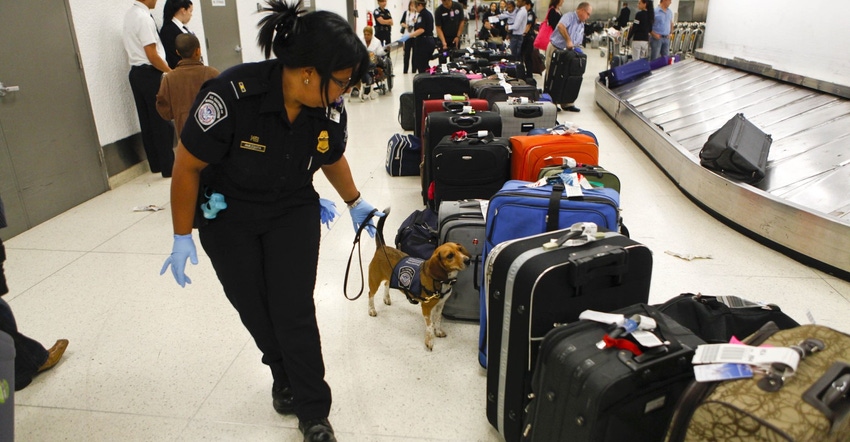Protecting America’s Food & Agriculture Act funds additional 740 new agricultural inspectors at CBP.

The House approved legislation under suspension of the rules that authorizes funding for 740 new Customs & Border Protection (CBP) agriculture inspectors at land, air and sea ports to prevent African swine fever and other foreign animal diseases (FADs) from entering the U.S. The legislation also authorizes 600 new agricultural technicians and 60 new agricultural canine teams.
In October 2019, the Senate approved an identical version of the bill (S. 2017), which the House approved on Monday. Sens. Gary Peters (D., Mich.), John Cornyn (R., Texas), Debbie Stabenow (D., Mich.) and Pat Roberts (R., Kan.) applauded the House passage of their bipartisan legislation. Rep. Filemon Vela Jr. (D., Texas) introduced the companion legislation in the House.
The U.S. Department of Agriculture and CBP work together to facilitate safe and secure importation of agricultural goods into the U.S. The program’s agricultural specialists and K-9 units conduct inspections of passengers, commercial vessels, trucks, aircraft and railcars at U.S. ports of entry to protect health and safety by preventing the entry of harmful goods and invasive species that may pose a threat to American food and agriculture. On a typical day, those inspectors process more than 1 million passengers and 78,000 truck, rail and sea containers carrying goods worth approximately $7.2 billion. According to CBP estimates, there is a shortage of nearly 700 inspectors across the country.
The Protecting America’s Food & Agriculture Act of 2019 authorizes the annual hiring of 240 agricultural specialists per year until the workforce shortage is filled and 200 agricultural technicians a year to carry out administrative and support functions. The bill also authorizes the training and assignment of 20 new K-9 teams a year, which have proved valuable in detecting illicit fruits, vegetables and animal products that may have otherwise been missed in initial inspections. Finally, the bill authorizes supplemental appropriations each year to pay for the activities of the agricultural specialists, technicians and K-9 teams.
“Our country faces a shortage of agricultural inspectors that could leave our agricultural industry vulnerable to diseases, pests and other threats that could devastate our economy and compromise the health and safety of millions of Americans,” Peters said. “I’m pleased the House passed my commonsense bill that will help facilitate secure and efficient international trade at ports of entry.”
House Agriculture Committee chairman Collin Peterson (D., Minn.) added, “I’ve long raised the issue of staffing levels at the border. It is critical that we have enough CBP agriculture inspectors, specialists and canine teams to protect our ag operations and our rural economy from foreign animal and plant pests and diseases. I represent a border district where agriculture is a top industry, and the Protecting America’s Food & Agriculture Act authorizes the crucial resources to help protect districts like mine. We need to do what we can to prevent these pests and diseases from endangering our domestic sources of production.”
The legislation is supported by a broad coalition of groups, including the U.S. Chamber of Commerce, American Farm Bureau Federation, Border Trade Alliance, National Association of State Departments of Agriculture (NASDA), National Pork Producers Council (NPPC), National Treasury Employees Union and Airports Council International of North America.
“Invasive species have been estimated to cost the U.S. economy more than $120 billion annually, with more than half of that amount representing damage to American agriculture,” NASDA chief executive officer Dr. Barb Glenn said. “NASDA strongly supports funding for additional staff and canine units to enhance and maintain a framework designed to protect our nation’s food and agriculture through education, research, prevention, monitoring and control.”
Providing additional agricultural inspectors represents a top priority for NPPC. "For more than a year, NPPC has advocated for more agricultural inspectors at our borders," said NPPC president David Herring, a hog farmer from Lillington, N.C. "The U.S. Department of Agriculture and the Bureau of Customs & Border Protection have done much to mitigate risk to animal disease, but we must remain vigilant. Today's vote represents a tremendous victory for our farmers, consumers and the American economy.”
The most likely path for a FAD to enter the country would be through the illegal transport of contaminated products, NPPC added. An outbreak of certain FADs would immediately close U.S. pork export markets, causing significant damage to farmers and consumers. NPPC continues to advocate for other FAD preparedness measures, including quickly establishing a U.S. foot and mouth disease vaccine bank, as provided for in the 2018 farm bill. The U.S. does not currently have access to enough vaccine to quickly contain and eradicate an outbreak of this disease.
Britton Clarke, president of the Border Trade Alliance, said, “The last several months have demonstrated how critically important well-resourced ports of entry are to the nation’s economic health. The Border Trade Alliance applauds this effort to ensure that ever-increasing volumes of cross-border agriculture trade can be processed securely and efficiently at our ports by highly trained CBP agriculture specialists.”
Kevin M. Burke, president and CEO of Airports Council International – North America, added, “With rising volumes of passengers and cargo at our nation’s airports, fully staffed CBP ports of entry are crucial to facilitate the travel and trade that spurs the U.S. economy.”
About the Author(s)
You May Also Like




.png?width=300&auto=webp&quality=80&disable=upscale)
